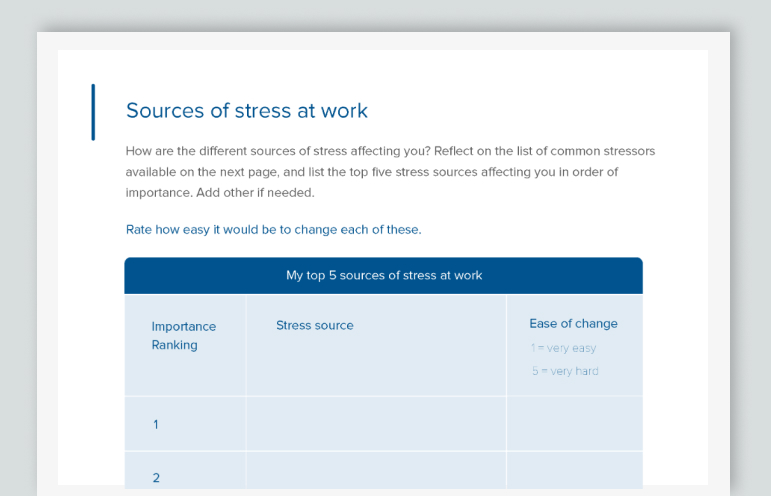Below you will find the steps to help you assess your mental health.
Individual level
Determine
Determining the sources of your workplace stress
01 Step one
Thinking about work, what are all the things that stress you? List as many as you can with the help of this template.
02 Step two
How are these sources of stress affecting you? From the list above, list the top five stress sources in order of importance. Rate how easy it would be to change each of these.
We all have a tendency to feel overwhelmed by the stress in our lives, especially when there are many sources and they seem difficult to change. One effective approach is to think about tackling one source at a time, starting with the easiest to change first. This may not be the biggest or most important source of stress in your life, but tackling it will give you a sense of control and success, as well as easing the burden a little.
Determining how your workplace stress is affecting you
01 Step one
The physiological manifestations of stress
Thinking about the last week that you were at work. Indicate how often you experienced the following signs and symptoms, at any time when you were travelling to work, at work or thinking about work.
|
Once a day or more |
2 to 3 times a week |
Once a week or less |
|
|
Feeling that your heart is pounding |
|||
|
Feeling that your pulse is racing |
|||
|
Excessively sweaty hands |
|||
|
“Butterflies” in the stomach |
|||
|
Feeling that you are having difficulty breathing |
|||
|
Feelings of muscle tension |
You do not appear to have many physiological signs and symptoms at this time. Some level of physiological arousal is fairly normal in life. However, it may be that you simply have not noticed the signs, or that over time you have grown accustomed to feeling the way you do. Ask those who work with you, and your close family and friends, whether they think you are experiencing stress.
You have distressing physiological signs and symptoms. You should concentrate on techniques aimed at alleviating these signs (for example relaxation techniques and/or exercises). See the section “Coping with the physiological manifestations of stress” below.
You have very frequent physiological symptoms, suggesting that you are having some signs at least twice a week, and possibly more often than this. You should consider tackling these physiological signs, but also address how you can make your environment less stressful.
Try
- Relaxation techniques
- Managing stress
See the section “Coping with the physiological manifestations of stress” below.
02 Step two
How workplace stress affects the way you think
Thinking about the last week that you were at work, indicate how often you found yourself experiencing the thoughts listed.
|
Once a day or more |
2 to 3 times a week |
Once a week or less |
|
|
Having difficulty concentrating |
|||
|
Forgetting things, particularly little details |
|||
|
Worrying about mistakes that you have made |
|||
|
Worrying about what patients think of you |
|||
|
Worrying about what colleagues think of you |
|||
|
Going over and over in your mind things that happened at work |
|||
|
Having difficulty making decisions |
|||
|
Losing confidence in yourself |
|||
|
Thinking of yourself as worthless |
|||
|
Feeling unhappy and depressed |
You rarely think negatively about your work situation. This is a good strategy and suggests you have problem solving skills, which do not involve feeling negative about the situation. You should try completing the other questionnaires in case your stress manifests itself in a different way.
You experience quite a number of negative thoughts in relation to your work. You should try to use techniques to modify your way of thinking (cognitive restructuring). See the section “Changing your thoughts” below.
You frequently think negatively about your work. You are probably approaching the limits of your stress. This high score is particularly concerning if you have indicated a very frequent response to the items marked with an asterisk.
See the section “Changing your thoughts“ below.
03 Step three
How workplace stress affects the way you act
Thinking about the last month have you noticed any of the following changes in your behaviour?
- Smoking more
- Drinking more alcohol
- Changes in diet (eating more, eating less)
- Seeing less of friends
- Taking sick leave from work
- More arguments with colleagues
- Working late more often
- Missing more lunch breaks
If you have noticed any of the changes in behaviour listed above then stress is having an impact on your life. The more of these changes that you have ticked the more priority you should give to changing your stress experience.
Changing behaviour is difficult and is best approached by changing the environment that you live and work in, the way you think about your behaviour and the behaviour itself.
See the sections “Changing your behaviour“ and “Making your environment stress free”.
Note: For follow-up, you may want to write down the number of behaviour changes you have noticed. You can use the template on step 02.
04 Step four
How workplace stress affects your health
Thinking about the last month which of the following aspects of your health have changed negatively?
- Feelings of tiredness and headaches
- Increased number of headaches and migraines
- Increased number of colds
- Indigestion
- Feelings of low self esteem
- Feeling anxious
- Feeling depressed
The changes noticed above are all to be taken seriously. If you are experiencing any of these changes you may want to discuss them with your General Medical Practitioner or Physician. You also need to tackle the stress in your life.
See sections “Coping with physiological manifestations of stress” and “changing your behaviour”.
Note: For follow-up, you may want to write down the number of behaviour changes you have noticed. You can use the template on step 02.


